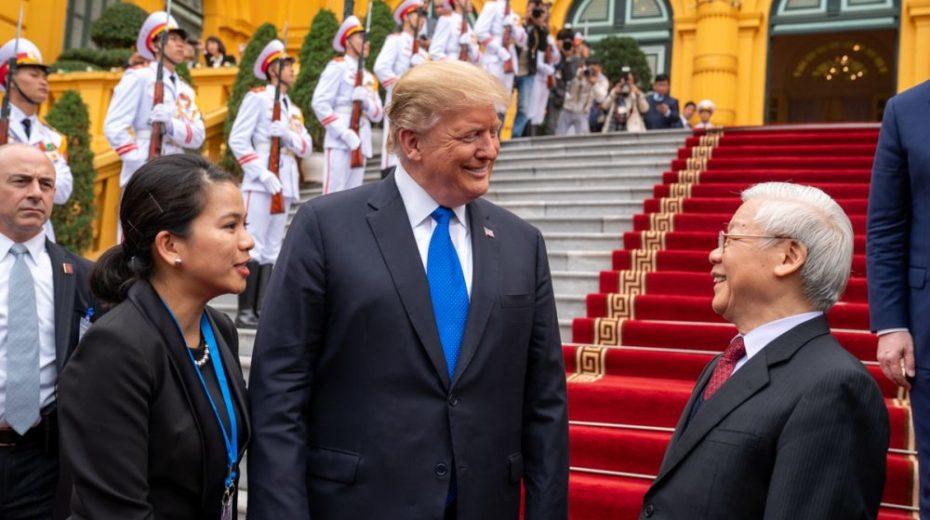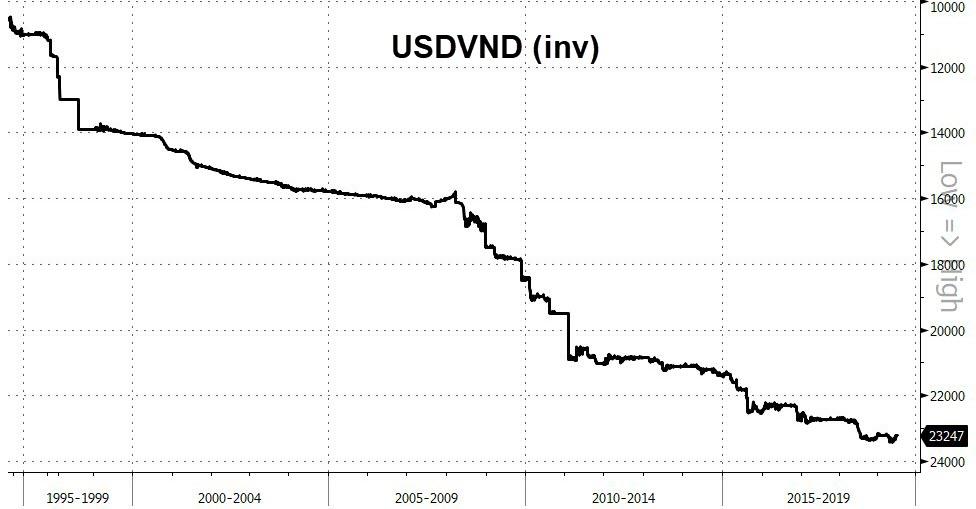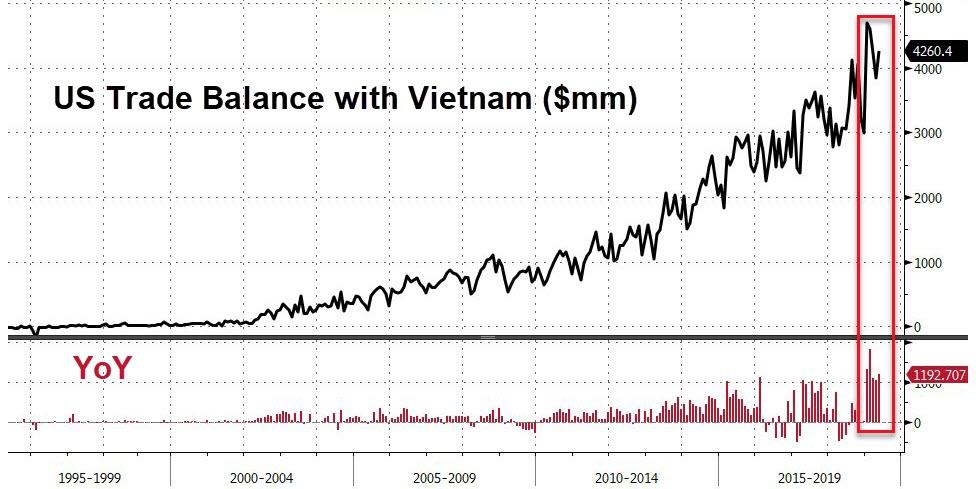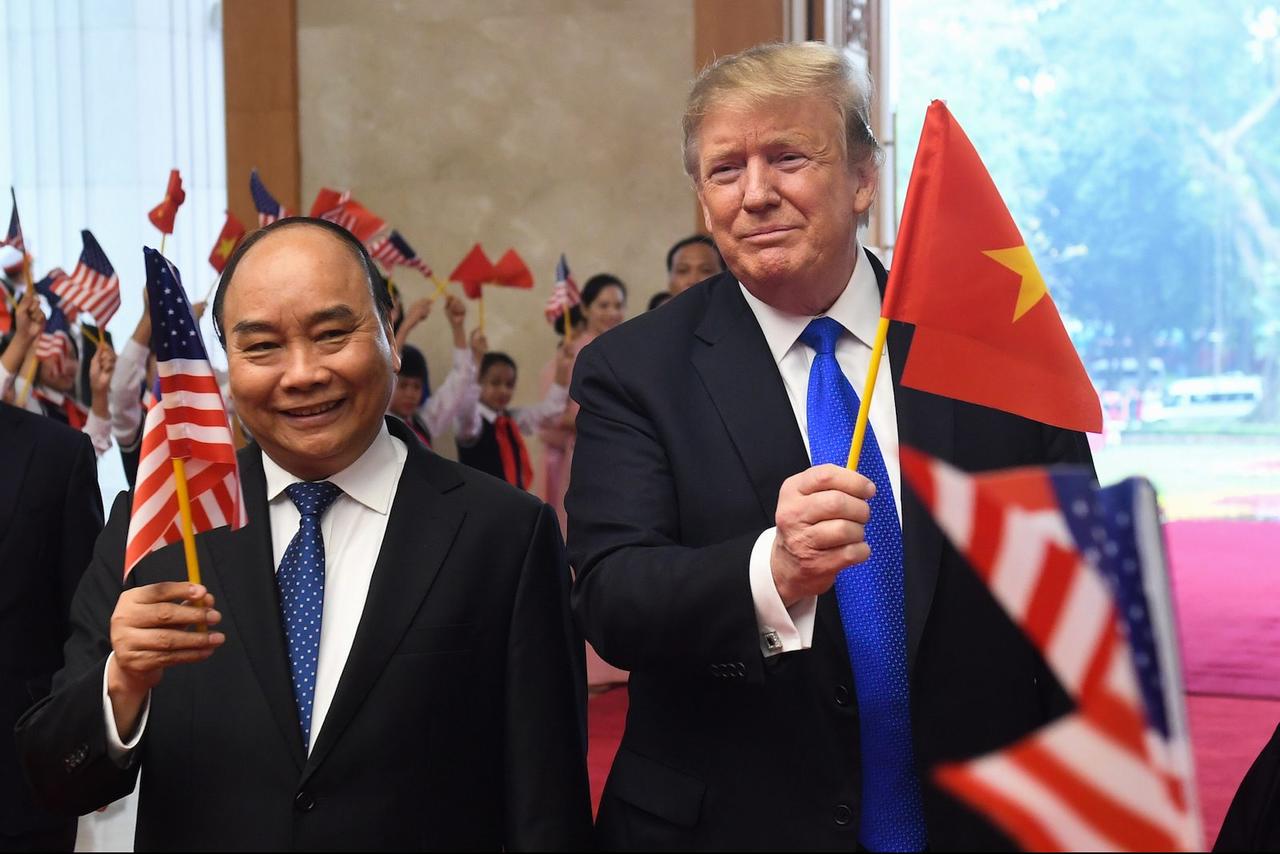Authored by David Hutt via The Asia Times,
Southeast Asian nation has dramatically whipsawed between US-China trade war winner to potential next big tariffed loser
The popular consensus is that Vietnam has been one of the world’s biggest US-China trade war winners, as global supply chains shift production away from tariff-hit China and towards the low-cost Southeast Asian nation.
That upshot, one that may have added as much as 8% to Vietnam’s gross domestic product (GDP) according to one bank’s research, has apparently already run its full course as US President Donald Trump slaps new punitive tariffs on Hanoi’s exports.
In May, Vietnam was added to the US Treasury Department’s list of possible currency manipulators, a designation that could result in punitive measures if proved. That threat presaged this month’s imposition of a whopping new 400% US duty on Vietnamese steel imports that originate from South Korea and Taiwan.
The US could next slap punitive tariffs on certain Vietnamese imports based on allegations Hanoi is allowing Chinese-made products to be rebranded as Vietnamese goods before export to the US to circumvent tariffs on China, a process officials refer to as “transshipment.”
Some economists predict that, for instance, if the US moves to impose a 25% tariff on Vietnam’s exports, as it has done with China for reasons of national security, the move would cause Hanoi’s exports to fall by a quarter and shave off more than 1% from GDP.
That could be in the offing, analysts reckon, in light of Trump’s scathing comment last month that Hanoi was “almost the single worst abuser of everybody” in regard to trade and that “Vietnam takes advantage of us even worse than China.”
That critique was aimed at Vietnam’s high and rising trade surplus with the US, which hit a record US$40 billion last year, up slightly from 2017 and in spite of a concerted Vietnamese effort to buy more from the US.
In the first five months of this year, Vietnam’s trade surplus with the US hit $21.6 billion, double the amount compared with the same period in 2018.
Beyond the rhetoric, America’s new tariffs on Vietnam represent a drastic course shift, one that has caught Vietnamese officials off guard amid what was a strong bilateral warming trend under the Trump administration.
In February, when Hanoi staged a second historic round of US-North Korea peace talks, Trump lavished praise on his Vietnamese hosts.
“You’ve made tremendous progress and it’s a great thing for the world to see,” he told Vietnamese Prime Minister Nguyen Xuan Phuc while referring to the one-time battlefield adversaries as “friends.”
Soon after Trump took office in January 2016, Vietnam was one of the first targets of his complaints that certain nations maintained big, unequal trade surpluses with the US.
Those complaints were mollified somewhat after Phuc visited Trump at the White House later that year with a multi-billion dollar purchase order for several Boeing-made commercial aircraft.
Communist Party sources, who spoke on condition of anonymity, say they are perplexed by Trump’s volte face. For the last two years, Trump has acted as though Vietnam and the US were “best friends”, one Vietnamese official told Asia Times.
The officials say it is unclear whether the Trump administration is genuine about its threat of possible future sanctions on Vietnamese imports, or whether it is a dramatic negotiating tactic to extract more concessions.
Sources say that Vietnam has made the kind of trade-related commitments that they think Washington supports, and that Trump’s latest comments could merely aim to accelerate their implementation.
For instance, a planned law to create three new special economic zones, which sparked rare nationwide protests last year as many thought they would allow Chinese firms to purchase large swathes of Vietnamese land, has now been indefinitely postponed.
Meanwhile, National Assembly delegates recently called on Communist Party functionaries to curb Chinese investment in Vietnam, with lawmakers arguing that Hanoi should be more particular about which foreign-invested projects it accepts.
Vietnamese authorities have also stiffened a crackdown on Chinese products being re-routed through Vietnam on their way to the US, a circumvention of tariffs that has greatly peeved the Trump administration.
To some extent, Vietnam has mitigated the costs of possible US sanctions by signing trade deals with other partners. Earlier this year, it formally became part of the reformed Comprehensive and Progressive Agreement for Trans-Pacific Partnership, a multilateral trade pact which Trump took the US out of in one of his first acts as president.
Moreover, on June 30, Vietnam finally signed a free-trade agreement with the European Union after several years of protracted negotiations.
The deal, which will remove import duties from 99% of Vietnam’s exports within seven years, up from 71% when the deal was signed, could boost Vietnam’s exports to the EU by 20% in 2020, according to official estimates.
Last year, the EU purchased $42.5 billion worth of Vietnam’s exports.
Still, the US is Vietnam’s most important trading partner, a fact that is not likely to change any time soon. Last year, the US imported $49 billion worth of Vietnamese goods, while exporting just $9.6 billion to Vietnam.
In the first five months of this year, US imports of Vietnamese goods have jumped to $25.8 billion, compared to $18.9 billion over the same period last year, evidence that Vietnam is benefitting immensely from the trade war.
In June, Japanese investment bank Nomura estimated that Vietnam had gained the equivalent of 7.9% of its GDP from trade diversion and supply chain shifts caused by the US-China spat. (The second largest beneficiary was Taiwan, which has gained about 2.1% of its GDP, the research shows.)
Some analysts believe Washington’s reaction to Vietnam’s trade practices is perfectly normal, particularly in light of allowing Chinese companies to use it as a base to disguise their exports to the US.
Vietnam, now one of the world’s 50 largest economies, is simply being asked to abide by the same rules the US expects from other trading partners – the same rationale that led to the US-China trade spat.
“Every fast-industrializing Asian nation has been at first indulged by the US and other major Western trading partners and then, as its market power became formidable, pressed to play by the rules of international trade,” wrote David Brown, an expert on Vietnam, in World Politics Review this month.
“Japan, Taiwan, South Korea, Singapore and Taiwan all cleared that hurdle years ago, none without considerable turmoil. Vietnam is still on probation, and must find the self-discipline to prioritize its larger interests,” the ex-US diplomat added.
Geopolitics, however, are confusing matters. Hanoi has enjoyed US preferential treatment for years because of its strategic importance to American interests, including vis-à-vis China in the South China Sea.
When former US president Barack Obama launched his “pivot to Asia” policy earlier this decade, Vietnam was considered an important new ally because it was one of the few claimants that strongly opposed Chinese expansionism in the maritime area.
Overlooking Vietnam’s many faults – namely it’s abysmal human rights record – has been the price Western nations paid to secure cordial relations with a government that agrees on the need to contain China’s regional rise.
Vietnam has willingly flaunted this position to extract concessions from the West while often playing the US and China off one another to maximize diplomatic benefits from both.
Trump’s recent moves have certainly and unexpectedly put Hanoi on the back foot. Sources say its bureaucracy is working overtime to reform its system on export permits, while also mulling new ways of to reduce its trade surplus.
It is no secret that the US wants Vietnam to purchase more American-made military equipment, and move away from its traditional arms supplier, Russia.
Buying a big-ticket cache of new US military hardware would certainly be looked upon kindly in Washington, a move that would help to narrow Hanoi’s trade surplus while further cementing US-Vietnam defense ties.
via ZeroHedge News https://ift.tt/2Gke4Ao Tyler Durden



